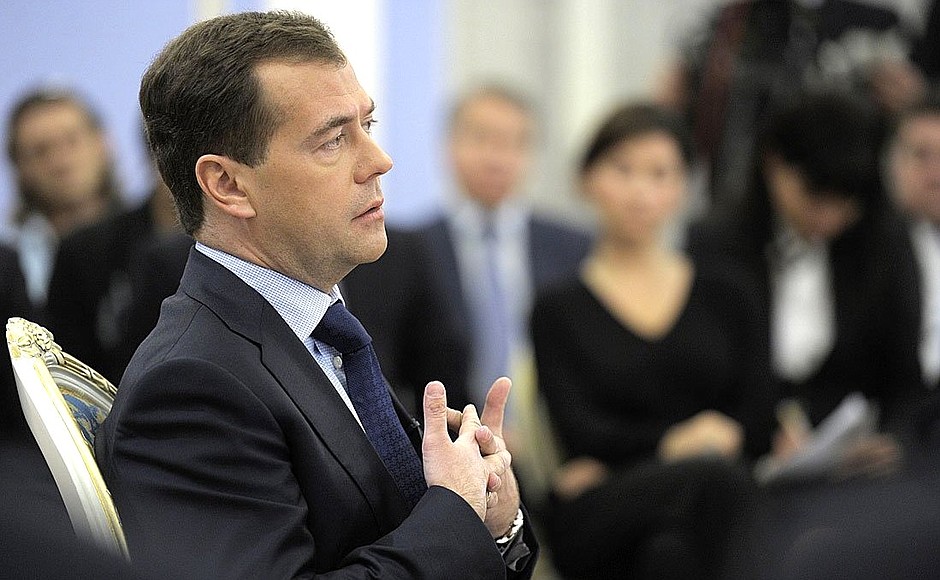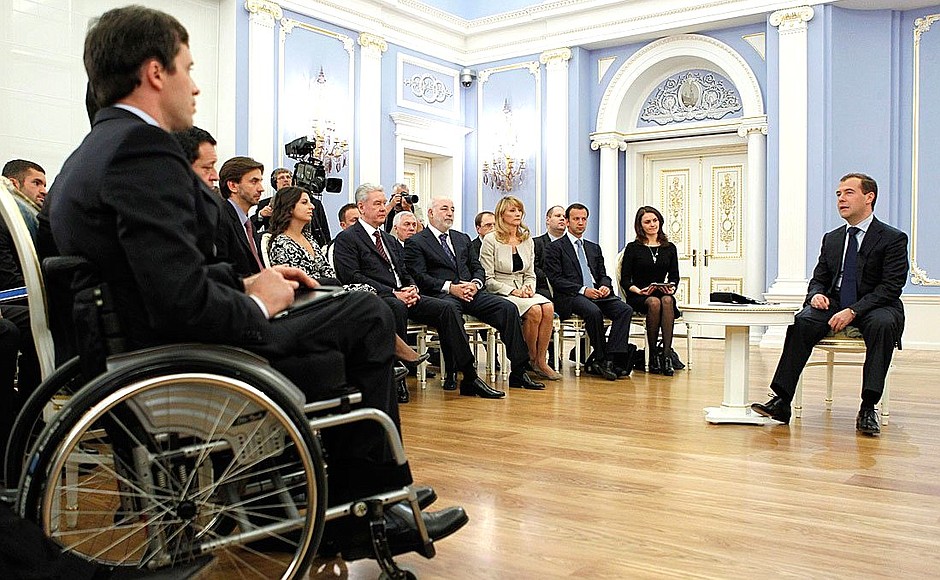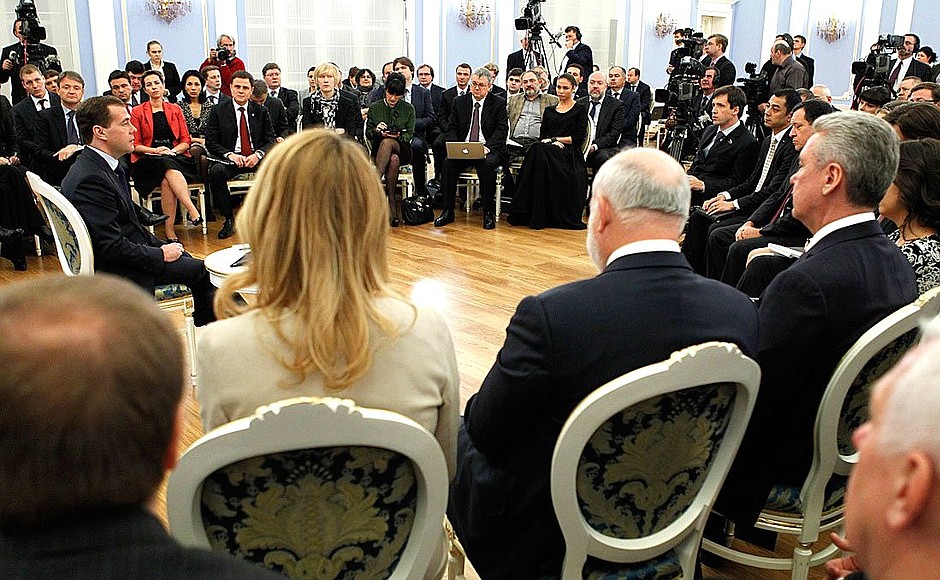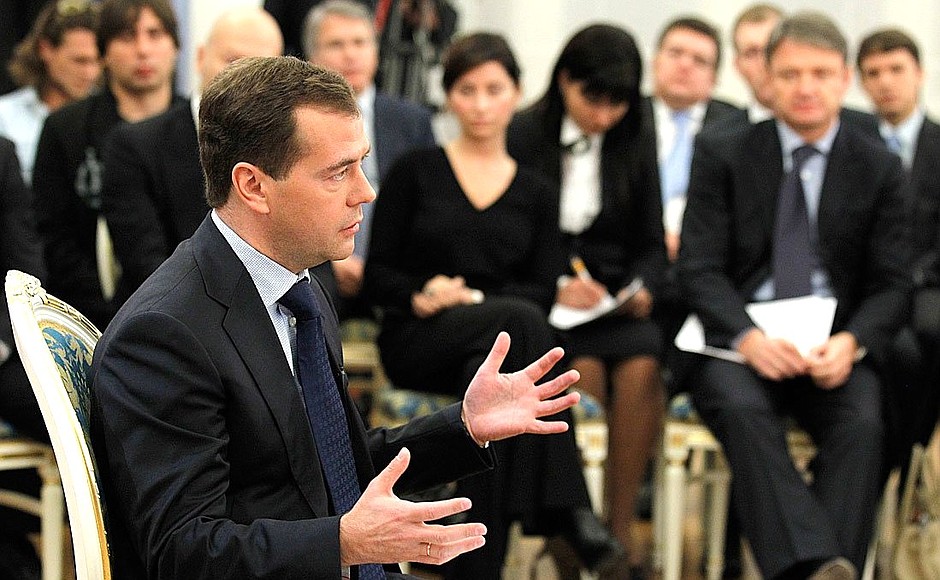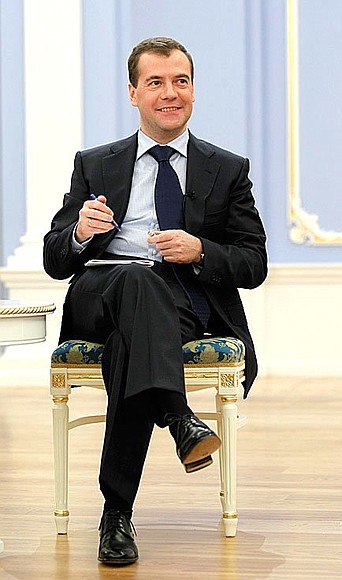See also
The Public Committee’s purpose is to draft proposals for state administration reform and also propose feedback tools that would get the public more involved in running the country.
* * *
President of Russia Dmitry Medvedev: Good afternoon everyone, thank you for coming here today.
Let me remind you of the events of these last few days. There was the meeting with my supporters on Saturday, at which the proposal was made to establish a public committee to work on state administrative reform and reflect on the way we want our government and society to look in the future. It was Mikhail Abyzov who made this proposal, though the idea was in the air really and so Mikhail probably can’t claim exclusive authorship, but thanks to him anyway for formulating the proposal. It received my support and the support of the others present at the meeting too, as I recall it.
There has been quite a lot of reaction in the media, and I have read much of what people have been writing. We can discuss all of this today, discuss your comments and my responses. Whatever the case, the proposal has not gone unnoticed, and this is good because it means that we have touched the right public nerve. I therefore decided not to delay and to invite you all here to my office, those who were at the meeting on Saturday, and those who were not there, but who I see as likeminded people, to decide how to proceed from here.
If there are no principled objections to the idea of this public committee then we could discuss today what exactly the committee will do, what its future tasks will be, and how we can ultimately use it as a communications tool and prototype of the ‘extended government’ that I spoke about on Saturday at the Digital October centre.
All of you here are people who I know, people I have heard about, or people who work together with me. But the circle of likeminded people does not stop here. It can grow in any case, change and transform. Simply, today I have invited those who I want to invite to begin this work.
Last time, at the Digital October centre, I did a lot of the talking myself, talked for more than two hours in fact. I don’t know how you all found the patience. I heard some say it was no problem, but others say it got a bit wordy. I will not talk a lot today. I want to hear what you have to say, listen to your proposals on what you think the best way to begin this work.
You come from a broad range of walks of life: from the regional and local authorities, journalists, politicians, State Duma deputies, businesspeople, and members of the creative professions. Some of my helpers in the election campaign are also here, people from United Russia, but not only United Russia. You could say in any case that what has brought us all here today is also a kind of battle, not so much a political battle as the battle for our country’s brighter future. It has become a real tradition over time here to use battle terminology. It seems we cannot think in any other terms, though I can’t help but see in this the reflection of a constant sense of emergency that, frankly, is not to my liking. But our language has become so infused with this martial vocabulary that I cannot avoid it either.
In any case, we must move forward. I want us to discuss today how to go about modernising our country and society over the coming years in the political configuration that will result if we win the upcoming elections in December and next March.
We have set ambitious but noble goals that deserve our battle efforts. You all know these goals: a modern new economy based on intellectual advantage rather than raw materials resources, and modern democratic institutions that do not just exist on paper alone. I am far from thinking that our democratic institutions today exist on paper alone, otherwise I would not be in government at all and would no doubt join some other political movement, but I do think that our political institutions are not ideal in their work and frequently suffer from a range of problems. Just how to deal with these problems is another of the subjects we can discuss.
What else do we need? We need an effective social policy that encompasses the broad mass of our people and reaches out to almost every social group in the country. I do not think social policy should be narrowly focused on any one particular group.
Of course we need to work on the essential tasks such as eliminating poverty in our country and expanding the middle class. But it is clear that until such time as this happens we will need to think about the least well-off people in our country and try to make their lives more stable, attractive and modern.
Of course we also need to think about our veterans. Every country cares about its senior citizens of course. This is normal. We all need to reflect too on the situation we will face ourselves with time, because we all start off young of course, but eventually we all grow old.
We need to consider the needs of our people with disabilities. There are a lot of people with disabilities in Russia. These are active and creative people, but sadly, various social norms and laws have prevented them from always taking a full part in the normal modern life of which they would like to be a part. This is an issue we have discussed before. We need to look at how best to reorganise the legislation relating to people with disabilities and properly enforce these laws.
We need interethnic harmony. This is a separate and very complex issue for our country, which is home to a large number of peoples and religions, and for our society, in which we see the same processes and threats as exist in other countries today. These are challenges that need decisive and effective responses. We must act, and not just talk about building a harmonious world. The Soviet period did not succeed in building it, but perhaps we will. We need to feel out the right approach, work out how best to proceed.
Our political institutions, judicial system, law enforcement agencies, an honest police force, and the intelligence services all need to be under the control not just of the state authorities but of the public too.
The strong army that we have been developing and modernising over these last years is also an important institution in public life. It is my conviction, and I hope you support my view, that we must make sure that the changes that have taken place in the armed forces will remain in place and continue. Some of my colleagues think that our defence spending is a waste of money, but I do not share this view at all. We have begun genuine defence reform, and this has brought real change to the armed forces’ morale, as we saw in 2008, and not only then. Service pay and wages are higher, spirits are higher too, and they are getting new equipment. No country, and certainly not a vast and complex nuclear-weapon state such as ours, can get by without an army.
You all know these issues well. I want to hear what you have to say on any of these matters.
We need to develop our international relations, develop relations with the entire world based on mutual respect, recognition of state sovereignty of course, and also mutual enrichment. We cannot carry out our modernisation without other countries’ help and support. We should not fall for illusions: the iron curtain did not help anyone and the theory that social systems could develop autonomously ended up in a dead-end. But outside help should take the right form, meet our needs, and be based on equal partnership.
I have worked over these last few years to build our relations with the world, with West and East, and with our integration organisation partners, in just this spirit. I hope that we will continue developing this subject too, because much depends on the kind of relations we build with the countries around us.
The thing I want to say for a start is that of course everyone here believes that Russia and its people have a bright future ahead even if we do not always like everything that takes place here within the country and beyond its borders.
But under no circumstances can we turn back. The main fears in the air at the moment are about what this new political configuration will bring in the future: will we keep moving forward, or will we come to a halt and sink into stagnation. People draw analogies with the Brezhnev period. I already spoke about this at the meeting with my supporters at Digital October. Such analogies never hold up and are essentially pointless because the country has changed, we have changed, our social and political system and economic relations have changed, although we must not forget the past of course, must remember what the Soviet period meant. There can be no stagnation of any kind, no matter what fine words may decorate it. We must keep moving forward, confidently, perhaps gradually in some areas, but steadily. This is my credo, and I would hope that you all share it, so that we can continue our stubborn and steady progress towards achieving our goals.
Hasty measures never bring any good, although of course at times we would all like to set reforms moving faster, change the political system quicker and get our economic relations developing at a swifter pace, but not everything is in our hands here. As far as the economy goes, for example, we depend a lot on what happens elsewhere in the world, and no matter how great an effort we make ourselves to recover from the global economic crisis, we realise that what goes on abroad affects our growth rate, our recovery, our GDP growth, our efforts to curb inflation, and our work to resolve various social and economic problems.
In any event, the State Duma election campaign that is getting underway now is an excellent moment to reflect on the situation overall and consider the future. This is the main purpose of today’s meeting – to sum up the results and set out some approaches for the future.
You know, I am now top of United Russia’s party list. The party list was registered yesterday [at the Central Election Commission]. Naturally, the party’s main challenge is to win a majority in the parliament. But as I already said yesterday, this must be done transparently and fairly. United Russia has that opportunity.
Some people may criticise United Russia, but it is the party garnering the greatest popular support among our citizens, and it doesn’t need any special political technologies or administrative resources to win. I am certain that we will be victorious, and that our victory will be ensured by lawful means.
This victory will give us the opportunity to form a new government, which I hope will consist of young, energetic, modern people who think first and foremost about their nation. Naturally, it depends on how the people vote, because it is up to our voters to determine the fate of our nation.
Now, a few words regarding ‘large or extended government.’ Naturally, I am not referring to an increase in civil servants. As soon as this idea occurred, people began to interpret it in different ways, which is probably normal. On the contrary, I feel that the bureaucratic nucleus for this kind of government must be absolutely compact, inexpensive, and not a burden on our taxpayers and all citizens.
Something very important we discussed at Digital October is the system of feedback. I want to emphasise again that a system of feedback may be one of the most lacking elements in our society, due to historical reasons as well as the shortcomings in our work today. I would like to talk to you about how we can create such a system, whether through actions, councils, or a critical approach.
And all this work can become part of a major public mechanism – again, I emphasise, a major public mechanism. Because big reforms, major transformations and modernisation cannot be achieved by a small group of people. After all, we know what happens to various reform projects when they are dictated from the top, when nobody votes for them or needs them – they are complete fiascos. We have an enormous number of examples of this.
So in this work (perhaps this will sound too broad), I would like to rely on just about all societal forces, first and foremost, the United Russia party and the People’s Front, as well as the expert community, NGOs, civic unions, and even representatives of parties that may not be fans of our work, if they so desire, because there are always issues where we can reach a compromise and which unite any political forces.
When I meet with heads of parliamentary parties, or sometimes, all parties, there are certain topics that seem obvious to us, where we hold exactly the same position. This mainly involves international issues, because all throughout the world, people criticise their own governments and presidents of their own nations, but when they are abroad, they nevertheless defend the interests of their government. Incidentally, I feel that everybody should learn this approach. We often see various Russian political and semi-political figures that go abroad and, according to habits dating back to the 19th century, begin criticising their own state, talking about its deficiencies, how awful and corrupt it is, and how important it is for a particular foreign superpower to help fight that government. This was all invented at the end of the 19th century; we recall under what conditions, and what it led to.
I am not saying we shouldn’t criticise our international course, but sometimes, it’s shocking the way that certain of my colleagues behave when they are abroad with regard to their own Fatherland. But, as they say, it’s up to God to judge.
Today, we need to discuss how this type of public communication system will work, and what will be necessary. I would very much like to hear your thoughts on this matter, regardless of your positions.
In recent years (and to me, as someone who monitors the public sphere carefully, this is obvious), there have been many conversations about the growing divide between government agencies and the society, the public’s interests – about the over-centralisation of government, about how we have gone too far, and as a result, how public activity has faded, and how the authorities are deaf and callous.
You know, my feeling about it is as follows. I do not think we should paint the government only in negative colours. That’s just not an accurate representation. I would even go so far as to say (and maybe you will agree with me), paradoxically, that there are now more opportunities to reach the authorities, ranging from village leaders to the nation’s President, than there were in the 1990s, not to mention Soviet times. In principle, everyone has a chance to be heard by any level of power. That’s not the problem; the problem is that people are writing to the village leaders, and the President, and the Prime Minister, but the efficacy of these appeals is minute. That is a real problem.
It is very bad that in order for certain public mechanisms to function, the highest authorities must intervene. This is a sign of the power system’s inefficacy overall, when to resolve an elementary issue, you must appeal to the President, Prime Minister, or governor of a large region.
In addition, although all of us here are on the same team, if you will, with similar ways of thinking (among us are governors from various regions, including very large regions, as well as heads of municipalities and cities, and city mayors; you are all big bosses making very important decisions), let’s nevertheless look truth in the eyes: who among the governors can tell me that people consult with you on every issue? Nobody. Very often, even governors learn about decisions taken, which concern them personally, from the media. Sure, that isn’t how they learn about the socio-political course that will be taken in the next ten years (although this, too, is very important) or international decisions, but rather, concrete economic decisions. In other words, the authorities are also alienated from one another. I talk regularly with all the governors present here. But even those with whom I speak frequently still fall out of the global communication flow.
This means our mechanisms are bad; they are not working. What can we say about public communication between authorities and businesses, cultural figures, professional unions, and public institutions? Often, it is merely for show. Please understand, I am not calling on every member of the community to appeal directly to the President; that’s the worst possible option. It’s just that we need a system that will allow us to resolve simple, basic issues at the relevant and adequate level. That is what we are lacking. If we fail to do this, we will not have normal development. I am not even talking about regular citizens, regardless of what class they belong to, or the poor, the elderly, or children, who represent a separate and even more complicated matter. Indeed, they should be the motivation for us to unite in our work.
We will not be able to resolve our political challenges using a single resource, even the most powerful resource, such as television, although television is already fading into the background. We have the Internet and other channels of communication, but most people still watch television. It is not the only resource, and perhaps not the most important one for solving a wide variety of problems. That is why, in order to create this kind of big platform, I am asking for your help in this work.
I have a few concrete suggestions. What do we need to do?
First, we need to update our strategic development programmes. This does not mean our strategies are wrong. No, overall, they are quite adequate, but on the other hand, we are following these strategies very slowly, and moreover, life is making its own adjustments. Furthermore, long-term plans are called that because they are created for years ahead. Some of them were formulated when Vladimir Putin was the President of Russia, and some were created during the current presidency. But all of them must be updated regularly, and most importantly, they must be made suitable for modernisation. I feel that is critical.
Second, I would like for us to discuss the issue of creating a working ‘extended government.’ For this, we need a concept, including a concept for profound reform of administrative management, state administration, reform and modernisation of government agencies, for cleaning out those agencies, if you will. And this topic should be discussed as widely as possible, while making use of a range of resources: real resources, virtual resources, party-affiliated and independent resources.
Third, it is very important to involve as many people and organisations in this work as possible, including with the help of online technologies – we spoke about the importance of using them at the meeting in Digital October, so naturally, we will be making use of them.
Fourth, we need to form a talent pool at every level in order to create this ‘large’ or ‘extended government.’ This is an extremely important issue. I have tried to create a talent pool over the course of all these years. I cannot say this pool is entirely absent, but there are some serious problems. We are falling behind more developed democracies and, sad as it may sound, even our Soviet predecessors for certain positions. Yes, they had their own selection criteria and methods, their own system of ‘social elevators,’ which does not suit us, but the fact remains that there was a system in place. We do not have a full-fledged system of this kind, although it is working quite well in many territories under regional conditions.
Fifth, we need to participate in elections, and I invite anyone interested to be my election agent in this campaign – not just in the legal sense of the word, but in fact, as well: to meet with people, talk with them about problems, listen to criticism of the government, the President, and the Cabinet, and share our plans.
I would like to add something that everyone is waiting for – that is, everyone who has been analysing our recent meetings. I do not know how well we are doing with establishing this ‘extended government,’ although I am certain that we can create an interesting working mechanism. But if we are successful, if we succeed at the elections – and I am certain that there is a good chance we will – then some of you will certainly be invited by me or other government agencies, from ‘small government’ (various ministries and departments) to other organisations, because we always need like-minded people with whom we can share responsibility for important processes we are working on. I think that is absolutely the right goal.
But even if this phase goes as planned (again, I have no doubt that it will), then I propose we maintain this public committee, which is present here today. Because otherwise, this serves as just another kind of pre-election poster – we use it, thank everyone, and sign certificates for participating in the electoral campaign.
I feel that this public committee should not be disbanded. Instead, it should be made a permanent consultative body of the Cabinet. That does not mean, of course, that it should supplant the Cabinet, but in any case, it could continue meeting at reasonable intervals, meeting with Cabinet leadership; we could even form certain groups within this public committee. Some of you could even head these groups, assuming the work is not transferred to government positions, especially since some of you are already in those positions.
Well, I only wanted to speak a little bit, but in the end, I said a lot. I promise that I will say almost nothing else today. I hope that you will do most of the talking, although naturally, I will make some concluding remarks at the end of this conversation.
* * *
I think people will probably say of this meeting today that, first, it is all about a bunch of careerists who have gathered to promote themselves in various areas, secure new posts, and ensure themselves support in the new Government, should it be formed, for whatever projects they have, be they in the social sector, culture, science, or education.
Second, the commentators will say that this is all a lot of idle chatter that will not produce any actual results. It’s all just talk, they will say, people satisfying their own ambitions, all the more so as it’s being shown on live TV, but nothing will come out of it. Others will say that the people here today have all long since achieved their own objectives and should make way now for new faces, since only new people can effectively address the tasks at hand for our country.
But none of this bothers me in the slightest because I know for a fact that only those who put in the hard effort, show an interest and take an active position achieve success. As a rule, all of these commentators waiting for fortune to smile on them just follow from the sidelines the developments in the country, whether in business, politics, education, culture, or sports. There are quite a lot of such people.
I am not suggesting they are bad people in any way, no, they are just as much our citizens too, but they take a less active position than you do. All of you therefore bear the great responsibility of ensuring that what we talked about today does not become just some kind of discussion club but really is put into practice. I think that we have the conditions we need to achieve this, if only because all of you really do have genuine achievements to your name, and this real experience is the main condition.
To be honest, I would not have invited you to come today if you had not yet achieved results but were simply still just promising young people. People have to show what they are capable of. If you see what someone has achieved, what they are capable of, you know that this is someone you can get involved in big undertakings, someone who can take part in serious work of the kind that we have initiated.
I think we will form an excellent team. This does not mean that if we achieve our final aim next year will come and we will resolve every problem within just six months. Of course it will take longer, of course we will need to keep slaving away for perhaps a long time yet, and take our share of frustration and disappointment along the way, but we know how to do this. The main thing is not to give up, because we really are in the process of changing the country, and there is no one else capable of doing this right now.
I am not going to make a campaign speech right here and now, because we are here for a different purpose today. Campaign meetings have their own particular rules and we shall not infringe the election laws. But let me say, nonetheless, that you can count the real political forces in this country on your fingers, and the number of parties actually capable of running the country is, sadly, even smaller again. Our task therefore is to fully realise the potential that we have.
But at the same time, it is absolutely essential that the social lifts and the contract between society and the authorities do not remain just lofty concepts but become actual reality in our lives. This is essential because we are to be able to see who will succeed us in the broad sense, see that there are people with the right preparation, people capable of taking the reins of government in their hands, and not just at the top level, but also at the middle levels, at the regional and municipal levels. The task of expanding the reserves bench is therefore absolutely crucial for Russia today.
I know that you are thinking about the future, and I think about who will come to take my generation’s place. I think that this is what responsible politics is about. You must have an idea of who you can hand the work on to, who you can entrust with these big responsibilities. If we build the Public Committee’s and expanded government’s work in this spirit, I am sure that we will not let down the hopes of those who give us their votes in the election.
I count on you all very much, and I want to thank you for being so active today. My apologies to those who did not get a chance to speak today, but you will definitely have your chance next time we meet. Simply, every meeting has its rules. Let’s settle on getting work underway in the different formats: full meetings, different committees and commissions, and any other working bodies, only it all has to be without too much bureaucracy, that’s for certain. And let’s decide too on how regularly we will meet.
I think that if we decide this matter, we can meet at least once in full session again before the end of the year. This would be only fitting. I can even name the rough date on which we should schedule this meeting.
Response: When? December 5?
Dmitry Medvedev: Quite right! We should meet immediately after the election either to congratulate each other on a reasonable distribution of forces, regardless of party membership, or to say that we should work harder, and that someone else will do the work we outlined for ourselves. But something tells me it’s too early for us to retire yet. So, if we meet again, it will be to get on with work.
Thank you very much, until our next meeting.
